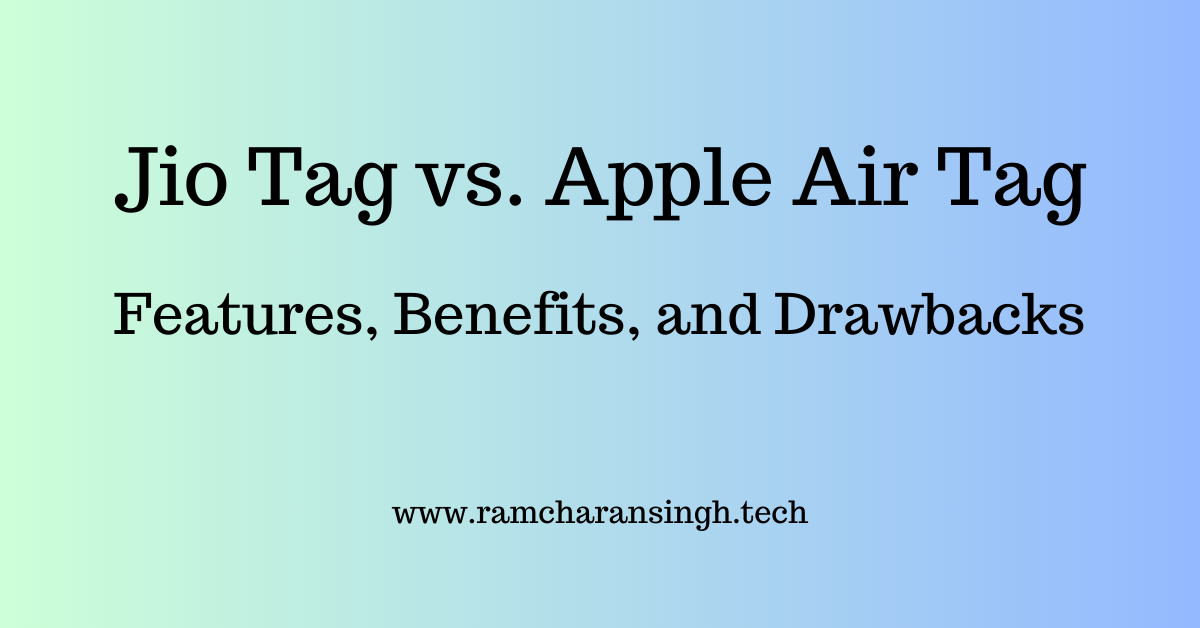Jio Tag vs. Apple AirTag: In an increasingly connected world, keeping track of personal belongings has become both a necessity and a convenience. Enter the realm of digital tracking devices, or tags, which offer a modern solution to the age-old problem of lost items. These small, portable devices can be attached to various objects, allowing users to locate them using their smartphones.
Among the prominent players in this space are the Jio Tag and Apple AirTag. Both devices promise to simplify the task of finding misplaced items, yet they come with distinct features, benefits, and potential drawbacks. This article delves into a comprehensive comparison of Jio Tag and Apple AirTag, examining their functionalities, advantages, and any harmful aspects, to help you decide which tag best suits your needs.
Jio Tag vs. Apple AirTag: Jio Tag offers an affordable, basic tracking solution compatible with both Android and iOS, while Apple AirTag provides advanced tracking features, seamless integration with the Apple ecosystem, and robust privacy measures, making it ideal for Apple users.
What is a Tag?
In the context of digital tracking, a tag is a small device that can be attached to objects to help locate them using various technologies such as Bluetooth, GPS, or RFID. These tags are part of a broader category of tracking systems that include barcodes and GPS systems, and they are used to track assets, monitor movements, and ensure the security of valuable items
Overview of Jio Tag and Apple AirTag
Jio Tag and Apple AirTag are both Bluetooth-based tracking devices designed to help users locate lost items. Despite serving a similar purpose, they have distinct features, benefits, and potential drawbacks.
Jio Tag
Features and Benefits:
- Bluetooth Connectivity: Jio Tag utilizes Bluetooth Low Energy (BLE) technology to establish a connection with smartphones. This allows users to track their items within a specific range, making it a practical solution for everyday use.
- Range: The device offers a range of up to 20 meters indoors and 50 meters outdoors. This range is sufficient for locating items within a typical household or office environment.
- Battery Life: Jio Tag is equipped with a replaceable battery that can last up to a year. This long battery life ensures that users do not need to frequently replace the battery, adding to the convenience.
- Companion App: The JioTag app, available on both Android and iOS platforms, provides an easy-to-use interface for tracking the location of tagged items. The app’s functionality makes it straightforward to manage and locate multiple tags.
- Affordability: One of the key advantages of Jio Tag is its competitive pricing. It is an affordable option, making it accessible to a broader audience who need basic tracking functionalities.
- Ringing Feature: Users can ring the tag from their smartphone to help locate it within the Bluetooth range. This feature adds an extra layer of convenience, especially for finding items in close proximity.
Potential Drawbacks:
- Limited Ecosystem: The JioTag ecosystem is not as extensive as Apple’s. This limitation may affect its functionality and integration with other smart devices, potentially reducing its overall utility.
- Privacy Concerns: Like any tracking device, Jio Tag poses potential privacy risks. There is a possibility of misuse for tracking individuals without their consent, which raises significant privacy issues.
Apple AirTag
Features and Benefits:
- Precision Finding: Apple AirTag employs Ultra-Wideband (UWB) technology for precise location tracking with compatible iPhones. This advanced technology provides highly accurate directions to the lost item, enhancing the user experience.
- Find My Network: One of the standout features of AirTag is its integration with Apple’s vast Find My network. This network comprises millions of Apple devices, which can help locate lost items even when they are out of Bluetooth range. This extensive network significantly enhances the device’s tracking capabilities.
- Seamless Integration: AirTag is designed to integrate seamlessly with iOS devices. The setup process is straightforward, and the device works effortlessly within Apple’s ecosystem, providing a user-friendly experience.
- Privacy and Security: Apple has implemented robust privacy measures in AirTag, including end-to-end encryption and alerts if an unknown AirTag is found moving with you. These features help protect users from unauthorized tracking, addressing common privacy concerns.
- Battery Life: Similar to the Jio Tag, the AirTag features a replaceable battery that lasts about a year. This long battery life ensures that users do not need to frequently replace the battery, adding to the convenience.
- Water and Dust Resistance: AirTag is rated IP67 for water and dust resistance, making it durable and capable of withstanding various environmental conditions.
Potential Drawbacks:
- Price: The Apple AirTag is more expensive compared to other tracking devices like the Jio Tag. This higher price point may be a consideration for budget-conscious consumers.
- Compatibility: AirTag is primarily designed for the Apple ecosystem, limiting its functionality to Android users. This exclusivity can be a significant drawback for non-iOS users, who may not be able to fully utilize the device’s features.
- Stalking Concerns: Despite advanced privacy measures, there have been concerns about AirTags being used for stalking or unauthorized tracking. Apple has implemented features to mitigate this risk, but it remains a potential issue that users should be aware of.
While both Jio Tag and Apple AirTag serve the same fundamental purpose of helping users locate lost items, their distinct features, benefits, and potential drawbacks cater to different user needs and preferences.
Detailed Comparison Table: Jio Tag vs. Apple AirTag
| Feature | Jio Tag | Apple AirTag |
| Design | Square-ish design | Circular design |
| Weight | 9.5 grams | 11 grams |
| Dimensions | 38.2mm x 38.2mm x 7.2mm | 31.9mm x 31.9mm x 8mm |
| Connectivity | Bluetooth v5.1 | Bluetooth, Ultra-Wideband (UWB) |
| Range | Up to 20 meters indoors, 50 meters outdoors | Not specified; enhanced by Find My network |
| Battery | CR2032 (Replaceable) | CR2032 (Replaceable) |
| Battery Life | Up to 1 year | About 1 year |
| Companion App | JioThings | Find My |
| Tracking Capabilities | Basic tracking functionality | U1 chip for precise tracking |
| NFC Support | Not supported | Built-in NFC chip |
| Water and Dust Resistance | Not specified | IP67 rating |
| Privacy and Security | Basic privacy measures | End-to-end encryption for location data, alerts for unknown AirTags |
| Price | Rs 749 (approx. $10) | $29 |
| Accessories | Lanyard cable included | Requires separate purchase of holders |
| Community Find Feature | Supported | Supported via Find My network |
| Compatibility | iOS and Android | Primarily iOS |
| Additional Features | Double-tap to ring phone | Precision Finding, Lost Mode |
| Color Options | White | Customizable with accessories |
Key Takeaways
Additional Features: Apple AirTag includes features like Precision Finding and Lost Mode, providing a more comprehensive tracking experience. Jio Tag includes a convenient feature to ring your phone by double-tapping the tag
Design and Build: Jio Tag is square and slightly lighter than the circular Apple AirTag. The AirTag, however, boasts a more premium look with customizable accessories.
Connectivity and Range: Both devices use Bluetooth, but the AirTag also incorporates Ultra-Wideband (UWB) technology for more precise tracking. The Jio Tag offers a specified range of up to 50 meters outdoors.
Battery Life: Both devices use a replaceable CR2032 battery with a lifespan of about one year.
Tracking and Precision: Apple AirTag excels with its U1 chip for precise tracking and integration with the extensive Find My network, which significantly enhances its tracking capabilities. Jio Tag offers basic tracking functionalities.
Privacy and Security: Apple AirTag includes advanced privacy measures like end-to-end encryption and alerts for unknown AirTags, addressing potential stalking concerns. Jio Tag has basic privacy measures.
Price: Jio Tag is significantly more affordable, making it a budget-friendly option. Apple AirTag, while more expensive, offers advanced features and seamless integration with the Apple ecosystem.
Compatibility: Jio Tag is compatible with both iOS and Android devices, while Apple AirTag is primarily designed for the Apple ecosystem.
Conclusion
In the realm of digital tracking devices, Jio Tag and Apple AirTag both offer effective solutions for locating lost items, yet they cater to different user needs and preferences through their distinct features, benefits, and potential drawbacks.Jio Tag stands out for its affordability and essential tracking functionalities. It utilizes Bluetooth Low Energy (BLE) for connectivity, offers a reasonable range, and comes with a replaceable battery that lasts up to a year. The JioTag app, compatible with both Android and iOS, provides an easy-to-use interface for managing and locating tagged items. However, its limited ecosystem and basic privacy measures may pose some constraints, particularly for users seeking more advanced features and robust security.
On the other hand, Apple AirTag excels with its advanced tracking capabilities, including Ultra-Wideband (UWB) technology for precise location tracking and integration with Apple’s extensive Find My network. This allows for locating items even when they are out of Bluetooth range. The AirTag also boasts seamless integration with iOS devices, advanced privacy measures like end-to-end encryption, and alerts for unknown AirTags. While it is more expensive and primarily designed for the Apple ecosystem, its premium features and robust security make it a compelling choice for Apple users.
Recommendations
- For Apple Users: The Apple AirTag is the superior choice due to its advanced tracking features, seamless integration with iOS, and robust privacy measures. It provides a comprehensive and user-friendly experience, making it worth the investment for those within the Apple ecosystem.
- For Budget-conscious Users or Non-Apple Users: The Jio Tag offers a cost-effective solution with essential tracking capabilities. Its affordability and compatibility with both Android and iOS make it a practical option for users who need basic functionality without the need for extensive integration or advanced features.
Ultimately, the decision between Jio Tag and Apple AirTag depends on your specific requirements, budget, and the ecosystem you are invested in. Both devices effectively serve the primary purpose of helping users locate lost items, but their distinct features cater to different needs and preferences.




